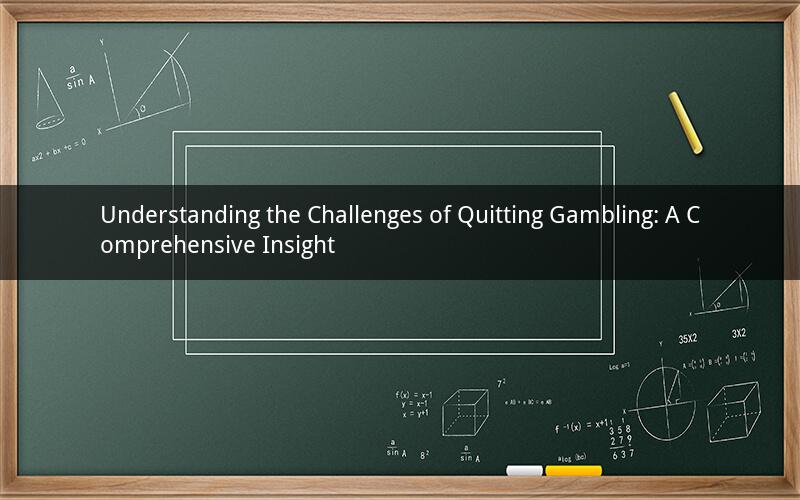
Gambling addiction is a serious issue that affects millions of individuals worldwide. For those who struggle with this addiction, the journey towards quitting can be extremely challenging. This article delves into the complexities of quitting gambling, exploring the various factors that contribute to its difficulty and providing insights into overcoming this addiction.
1. The Psychological Aspect
One of the primary reasons why quitting gambling is challenging is the psychological aspect. Many individuals find themselves emotionally attached to the thrill and excitement of gambling. The act of placing bets and winning money can trigger the release of dopamine in the brain, creating a sense of pleasure and satisfaction. This reinforces the addictive behavior and makes it difficult to break the cycle.
The psychological addiction to gambling can manifest in several ways, such as:
- Cravings: Individuals may experience intense cravings for gambling, similar to those associated with other substance addictions.
- Denial: Many gamblers struggle with denial, rationalizing their behavior and downplaying the negative consequences of their addiction.
- Guilt and shame: The guilt and shame associated with gambling addiction can make it challenging for individuals to seek help and overcome their addiction.
2. The Social Aspect
Gambling addiction often extends beyond the individual and affects their social relationships. Friends and family members may become aware of the problem and may react with anger, disappointment, or frustration. This can further isolate the individual and make it more difficult to quit gambling.
The social aspect of gambling addiction includes:
- Isolation: Individuals with gambling addiction may isolate themselves from loved ones, leading to feelings of loneliness and depression.
- Financial strain: The financial consequences of gambling addiction can strain relationships and create conflicts within families.
- Peer pressure: The presence of other gamblers who continue to engage in risky behavior can exacerbate the addiction and make it more challenging to quit.
3. The Financial Aspect
Gambling addiction can have severe financial implications. Individuals may go into debt, lose their homes, and face other financial consequences as a result of their addiction. The financial aspect of gambling addiction can be incredibly difficult to overcome, as it requires significant discipline and commitment.
The financial aspect of gambling addiction includes:
- Debt: Many gamblers accumulate substantial debt as a result of their addiction, making it challenging to regain financial stability.
- Loss of employment: The financial strain of gambling addiction can lead to job loss and a loss of income, further exacerbating the problem.
- Scams and fraud: Some individuals may turn to fraudulent activities to support their gambling habit, leading to legal and social consequences.
4. The Physical Aspect
Gambling addiction can also have physical consequences. Individuals may experience stress-related health issues, such as headaches, insomnia, and anxiety. Additionally, the financial strain of gambling addiction can lead to other health problems, such as heart disease and mental health disorders.
The physical aspect of gambling addiction includes:
- Stress-related health issues: The constant stress of gambling addiction can lead to a variety of health problems.
- Sleep disturbances: Many individuals with gambling addiction experience sleep disturbances, such as insomnia.
- Mental health disorders: The emotional and psychological toll of gambling addiction can contribute to the development of mental health disorders, such as depression and anxiety.
5. Overcoming Gambling Addiction
While quitting gambling is a challenging endeavor, it is possible to overcome this addiction with the right support and resources. Here are some strategies that can help:
- Seek professional help: Therapy and counseling can provide individuals with the tools and support needed to overcome gambling addiction.
- Join a support group: Connecting with others who share similar experiences can provide emotional support and motivation.
- Develop a financial plan: Creating a budget and setting financial goals can help individuals regain control over their finances and reduce the temptation to gamble.
- Identify triggers: Recognizing and avoiding triggers can help individuals stay on track and prevent relapse.
- Practice self-care: Taking care of one's physical and emotional well-being is crucial for overcoming gambling addiction.
FAQs
Q1: Can gambling addiction be cured?
A1: Gambling addiction is a chronic condition, but it can be managed and overcome with the right treatment and support.
Q2: How long does it take to quit gambling?
A2: The time it takes to quit gambling varies for each individual. Some may experience immediate success, while others may need ongoing support and treatment.
Q3: Can I overcome gambling addiction on my own?
A3: While it is possible to quit gambling on your own, seeking professional help and joining a support group can significantly improve your chances of success.
Q4: Are there any medications that can help with gambling addiction?
A4: There are no medications specifically designed to treat gambling addiction. However, some medications may help manage the symptoms of related mental health disorders, such as depression or anxiety.
Q5: Can I gamble responsibly?
A5: Responsible gambling is a myth. The nature of gambling makes it difficult to control and can lead to addiction. It is important to recognize the risks and seek help if you or someone you know is struggling with gambling addiction.